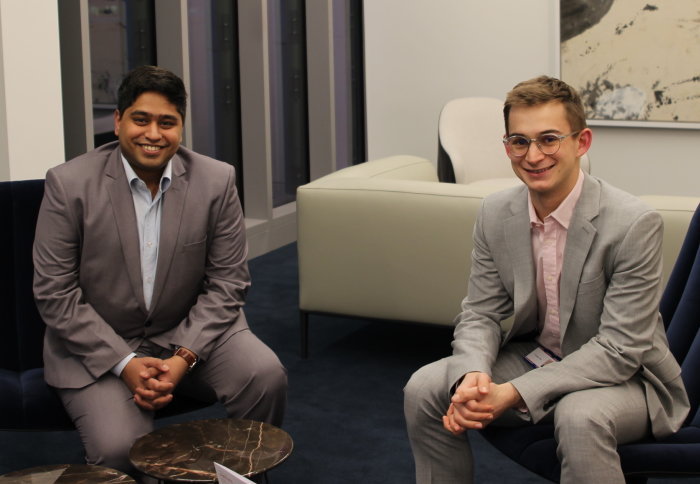MSc students inspire law firm to launch in-house data science team

Nirbhay Sharma and Otto Godwin at the DLA Piper offices
Two Imperial alumni have been recruited by law firm DLA Piper after their data science projects helped the firm uncover valuable insights in its data.
Otto Godwin and Nirbhay Sharma both won DLA Piper scholarships to study for Imperial’s MSc in Business Analytics. As part of their studies, they developed a tool for analysing billing data that helped the firm optimise the staffing profiles it applies to different kinds of work. The tool’s effectiveness prompted DLA Piper to establish its first in-house data science team, by offering the students roles as data scientists after they graduated.
A broad relationship
The scholarships were the start of a broader relationship between Imperial College Business School and DLA Piper on a range of initiatives to apply Imperial’s world-leading data science expertise to the firm’s data about its work. Other collaboration includes student projects on litigation and financial markets, and a postdoctoral fellowship working with DLA Piper to help Imperial academics understand the unfolding impact of automation on the world of work.
Dr Mark Kennedy, Associate Professor of Strategy and Organisation in Imperial College Business School, said: “DLA Piper are innovators. They have the data required to reveal insights that will improve not only the quality of legal services, but also the experience of doing legal work.”
Data science opportunity
The legal profession offers an interesting opportunity for data scientists aiming to understand the world of work, as law firms necessarily hold large volumes of data about their work for purposes such as billing. As a global law firm that acts on more mergers and acquisitions deals than any other, DLA Piper holds particularly large data sets. The relationship is therefore expected to yield insights that will help Imperial researchers to understand the changing nature of the legal field and DLA Piper to innovate in how it does business. “We look forward to breaking new ground as the collaboration develops” said Dr Kennedy.
It has been speculated that data science could eventually be used to predict the outcome of court cases. “There are just so many data points”, said Jana Blount, DLA Piper’s Change Maker. “If we could start to predict the outcome of litigation based on factors like the judge and the court, that could have significant implications for the way law firms operate”.
Connecting recruiters and talented students
The relationship also offers a way for the company to access Imperial’s student talent, and for students to find rewarding careers. Andy Williams, DLA Piper’s Chief of Staff, said: “Adopting this style of relationship was a great way for the students we recruited to get to know us, and us to know them. We would not have been a traditional landing space for them. This gave us access to absolutely top quality students in data science and enabled us to attract them towards the legal sector.”
Amanda Beggan, DLA Piper’s Head of Communications, said: “Imperial has a great reputation globally, particularly in data science. They saw that DLA Piper is a world-leading firm with a reputation for being disruptors and more entrepreneurial than most, and together we had a great opportunity to be at the forefront of data analytics in the legal industry and build something new.”
Imperial and businesses
The collaboration is just one example of the many ways that Imperial works with businesses. The College’s Enterprise Division recently launched its newest Review of Enterprising Activity, which gives an overview of College’s work in the last year to support industry and entrepreneurship.
Article text (excluding photos or graphics) © Imperial College London.
Photos and graphics subject to third party copyright used with permission or © Imperial College London.
Reporter
David Silverman
Communications Division